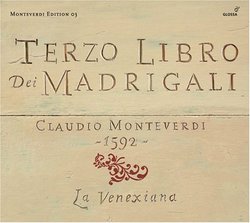| All Artists: Claudio Monteverdi Title: Monteverdi: Terzo Libro dei Madrigali Members Wishing: 1 Total Copies: 0 Label: Glossa Original Release Date: 1/1/2008 Re-Release Date: 6/24/2008 Album Type: Import Genre: Classical Styles: Opera & Classical Vocal, Historical Periods, Baroque (c.1600-1750), Symphonies Number of Discs: 1 SwapaCD Credits: 1 UPCs: 675754008468, 8424562209237 |
Search - Claudio Monteverdi :: Monteverdi: Terzo Libro dei Madrigali
 | Claudio Monteverdi Monteverdi: Terzo Libro dei Madrigali Genre: Classical
|
Larger Image |
CD Details |
CD ReviewsMonteverdi's early madrigals are timeless and beautiful Mike Birman | Brooklyn, New York USA | 03/13/2009 (5 out of 5 stars) "Most listeners of Classical music have a passing familiarity with Monteverdi's 1607 opera Orfeo, and with its emotional recitatives and its austere arias. As one of the first musical productions in the history of music to be recognizable as a true dramatic opera - one whose early success laid the groundwork for the future acceptance of the genre - it is a nearly miraculous coincidence that Orfeo also happens to be a work of genius. The other work by which Monteverdi is known is his 1610 Vespro della Beata Vergine. This sacred work assimilates both the old and new styles of Renaissance polyphony and Baroque emotional vigor into a unique hybrid work whose beauty has kept it in the repertoire for nearly four centuries.
Throughout his career Monteverdi composed nine books of madrigals, essentially a series of operatic short stories that contain some of the most beautiful music to be written during the Baroque era. It is in his madrigals that Monteverdi's genius for tone painting is first revealed. He is capable of portraying any emotion, evoking any mood or creating any type of atmosphere in his madrigals. Some of these works exhibit such utter mastery, they reach a level of matchless sublimity with their incomparable beauty of melody and perfection of orchestration when Monteverdi later adds instrumental accompaniment, that they remained unequaled until Mozart's Da Ponte operas of the 1780s. It is with his Third Book of Madrigals, composed in 1592, that Monteverdi attains his first compositional maturity with his mastery of sonority. Although essentially written in the prima prattica or strict Renaissance polyphonic style, the seeds of his later, freer compositional methods are all here to be heard. Nevertheless, the melodic beauty of these works represent Monteverdi's completely mature style. La Venexiana perform these works with their usual vocal mastery and assurance. It is hard to imagine these madrigals better performed than they are here. The singing is dramatic yet exhibits a stunning crystalline beauty that requires a certain emotional distance. Glossa's recorded sound is warm and rich with a lovely aural presence that fills the listening room. This is a spectacular recording that is most strongly recommended for all those Classical music lovers who appreciate Monteverdi's timeless genius. Mike Birman" |

 Track Listings (15) - Disc #1
Track Listings (15) - Disc #1